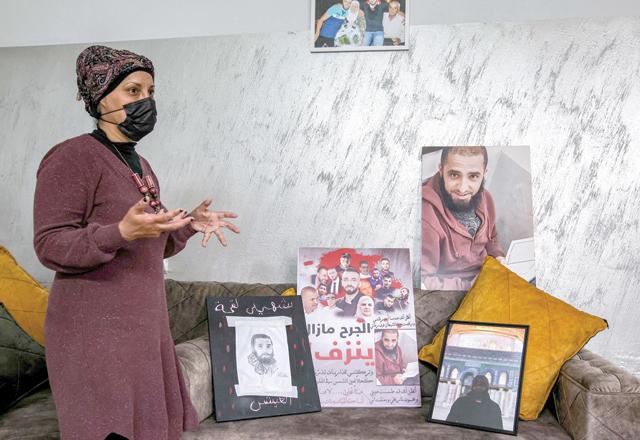- International News
- Web-2021-03-17 | 02:16 pm

It had been days since 14-year-old Mohammed Adas was shot dead outside his home in Israel, but his mother Suheila couldn't bear to wash his scent off his clothes.
Mohammed's killing was just the latest chapter in a crime epidemic ravaging Arab Israelis — many of whom blame police racism.
"No one knows who shot him or why," his father Abdelrazak told AFP at the family's home in Jaljulia, near Tel Aviv.
"What I do know is that the police are 20 metres from here and if my son was Jewish there would be helicopters everywhere."
Tackling the crime wave among the minority has become a political flashpoint ahead of March 23 elections.
Prime Minister Benjamin Netanyahu, who has demonised Arab voters in the past, has pledged action as he looks for support in a community that has traditionally rejected him and his right-wing Likud Party.
Most Arab Israeli leaders scoff at the suggestion that Netanyahu can ease the crisis, insisting the solution lies in tackling police prejudice against Arabs — something that has proliferated during the premier's 12-year tenure.
The night he died, Mohammed Adas had gone out for pizza with a friend.
Shortly afterwards, Suheila and her husband Abdelrazak heard gunshots.
Twenty minutes later, they found Mohammed lying in a pool of blood, behind a car a few metres from their home.
Suheila has since been inconsolable. Abdelrazak finds himself popping into his son's room, desperately hoping someone is there.
According to the Abraham Initiative, a civil society group that promotes social cohesion between Arabs and Jews in Israel, Mohammed Adas was the 23rd Arab killed in the country so far this year.
A 24th was killed this week.
In 2020, more than 90 per cent of shootings in Israel took place in Arab communities, according to police.
'They have cameras everywhere'
Arab Israelis, Palestinians who stayed on their land following Israel's creation in 1948, currently account for around a fifth of its population.
In Israel's last election a year ago, Arab parties united as the Joint List coalition, securing a record 15 seats in the 120-member parliament.
But the Joint List has splintered amid ideological divisions, creating a possibility that some Arab votes may be up for grabs.
That has put the spotlight on the violence rocking the country's Arab communities.
Kifah Aghbaria, who lives in the northern city of Umm Al Fahm, lost four relatives to crime last year.
She has demonstrated outside the city’s police station every Friday for weeks, with portraits of her dead relatives, all in their 20s and 30s, under her arm.
They were killed, she said, because they stood up to local mafia.
Solving the crisis would mean addressing police discrimination against Arabs, she said.
"They have cameras everywhere. How can they not find the criminals?”
"The fight against crime in Arab cities is a war and we are going to win it,” she added.
But she insisted that reelecting Netanyahu will not help.
Police spokesman Wassim Badr rejected accusations of inaction, telling AFP that officers were working "around the clock” to solve such crimes and had made arrests in connection with 19 of this year’s murders.
‘Ridiculous’
The collapse of the Joint List was partly triggered by Arab lawmaker Mansour Abbas, of the conservative Islamic Raam movement, suggesting he was open to supporting Netanyahu in order to address crime.
Netanyahu’s government on March 1 approved a 150 million shekel ($45 million) crime-fighting proposal for Arab communities, including expanding police stations and creating a new dedicated unit.
Netanyahu called it "major news for the Arab society in Israel”.
But Yousef Jabareen, a Joint List lawmaker with strong support in Umm Al Fahm, rejected the proposal.
The PM is "trying in a ridiculous way to get some [political] help from within the Arab community, as if we have a short memory and don’t remember that he’s responsible for these racist [laws] and policies towards us”.
Netanyahu’s backing for the 2018 Nation State Law, which enshrined Israel as a state for Jews while downgrading Arabic’s status as an official language, was widely perceived as legally downgrading Arabs.
"The issue is not about adding more police, but to change the policies vis-a-vis the Arab communities,” Jabareen told AFP.
He said unemployment, exacerbated by the coronavirus pandemic, was fuelling the violence.
And as the country gears up for elections next week, Abdelrazak Adas is waiting for answers as to why his son ended up lying dead in the street.
When Arabs kill each other, he said, "Nobody cares”.













